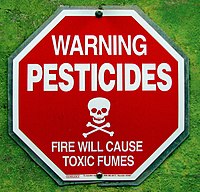
Photo from wikipedia
Abstract Objective Although pesticide poisonings occur worldwide, most high-income countries have not been severely affected. Japan is a key exception, with pesticide suicides becoming a major public health concern in… Click to show full abstract
Abstract Objective Although pesticide poisonings occur worldwide, most high-income countries have not been severely affected. Japan is a key exception, with pesticide suicides becoming a major public health concern in the 1980s. We here report the epidemiology of lethal pesticide poisoning in Japan in relation to its pesticide regulation and agricultural output. Methods We obtained data on pesticide registration and sales from the Japan Plant Protection Association’s annual Pesticide Handbook, National Food and Agricultural Materials Inspection Center, and Food and Agriculture Organization of the United Nations. Data on deaths due to pesticide poisoning and population were obtained from Vital Statistics of Japan. We reviewed the registration status and hazard classification of pesticides in Japan and analysed the relationships between the use/sales, pesticides fatalities, and agricultural output. Results Five hundred and twenty-nine pesticide active ingredients are currently registered in Japan, including four WHO hazard class IB organophosphorus and carbamate insecticides. Paraquat was registered in 1962 as a liquid SL20 formulation. In 1986, restrictions were imposed on its sale/use and a 4.3% paraquat ion/4.1% diquat ion combination product registered by ICI. There were 221 pesticide poisoning fatalities in 2019, down from 2648 in 1986, a 92% reduction over 33 years. Self-poisoning was responsible for most pesticide deaths in both 1985 (2013/2476, 81.3%) and 2019 (146/221, 66.1%). Pesticide poisoning made up 8.6% of all suicides in 1985, down to 0.7% in 2019. Unintentional pesticide poisoning deaths also all fell by 83.8%, from 463 to 75. These reductions were associated with reduced sales of both OP/carbamate insecticides and paraquat/diquat but no apparent change in agricultural output across a broad range of crops. Conclusions Reduced use of highly hazardous pesticides and lowered concentration formulations in Japan were associated with major decreases in all deaths from pesticide poisoning and the proportion of all suicides due to pesticide ingestion.
Journal Title: Clinical Toxicology
Year Published: 2022
Link to full text (if available)
Share on Social Media: Sign Up to like & get
recommendations!